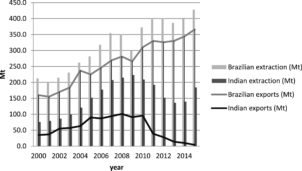
By Beatriz Macchione Saes and Arpita Bisht
Abstract
The emerging economies of India and Brazil experienced a strong increase in iron ore extraction during the late commodities boom. Despite similar extraction trends, these economies followed distinct development patterns. While Brazilian neoextractivism strongly promoted iron ore exports, Indian production was largely turned to domestic consumption as a response to demands of industrialization. In both countries, the resulting expansion of extraction frontiers into new spaces and ecosystems already inhabited by local communities generated several ecological distribution conflicts. In this paper we analyse iron ore mining conflicts exploring the links between conflicts dynamics and different development patterns of India and Brazil. By providing both quantitative and qualitative data on the selected cases, the study contributes towards addressing core-periphery dynamics as a key aspect of environmental (in)justice. We show that, while Indian social mobilizations were sometimes successful in delaying or halting the expansion of extractive frontiers, power relations in Brazil were less favorable to resistance movements. Still, even in India, international and national asymmetries impinged costs of extractivism to local communities. The reinforcement of environmental (in)justices related to extractive industries by very different development models points to the importance of debates around development alternatives, especially for emerging countries.
Keywords
Environmental Justice, Just Transitions, Energy Transition, Fossil Energy, Political Ecology.
Link
https://www.sciencedirect.com/science/article/abs/pii/S2214790X20302677#!
How to Cite
Saes, B.M., Bisht, A. 2020. Iron ore peripheries in the extractive boom: A comparison between mining conflicts in India and Brazil.The Extractive Industries and Society 7(4), 1567-1578, https://doi.org/10.1016/j.exis.2020.09.010

The project ENVJUSTICE has received funding from the European Research Council (ERC) under the European Union’s Horizon 2020 research and innovation programme (grant agreement No. 695446)